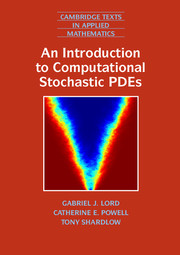Preface
Published online by Cambridge University Press: 05 July 2014
Summary
Techniques for solving many of the differential equations traditionally used by applied mathematicians to model phenomena such as fluid flow, neural dynamics, electromagnetic scattering, tumour growth, telecommunications, phase transitions, etc. are now mature. Parameters within those models (e.g., material properties, boundary conditions, forcing terms, domain geometries) are often assumed to be known exactly, even when it is clear that is not the case. In the past, mathematicians were unable to incorporate noise and/or uncertainty into models because they were constrained both by the lack of computational resources and the lack of research into stochastic analysis. These are no longer good excuses. The rapid increase in computing power witnessed in recent decades allows the extra level of complexity induced by uncertainty to be incorporated into numerical simulations. Moreover, there are a growing number of researchers working on stochastic partial differential equations (PDEs) and their results are continually improving our theoretical understanding of the behaviour of stochastic systems. The transition from working with purely deterministic systems to working with stochastic systems is understandably daunting for recent graduates who have majored in applied mathematics. It is perhaps even more so for established researchers who have not received any training in probability theory and stochastic processes. We hope this book bridges this gap and will provide training for a new generation of researchers—that is, you.
- Type
- Chapter
- Information
- An Introduction to Computational Stochastic PDEs , pp. ix - xiiPublisher: Cambridge University PressPrint publication year: 2014

